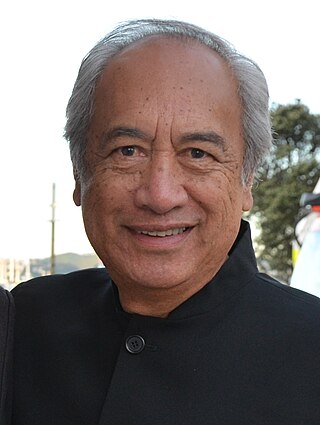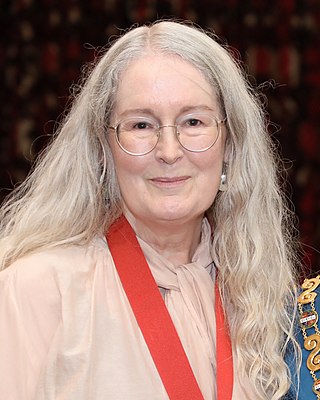
New Zealand literature is literature, both oral and written, produced by the people of New Zealand. It often deals with New Zealand themes, people or places, is written predominantly in New Zealand English, and features Māori culture and the use of the Māori language. Before the arrival and settlement of Europeans in New Zealand in the 19th century, Māori culture had a strong oral tradition. Early European settlers wrote about their experiences travelling and exploring New Zealand. The concept of a "New Zealand literature", as distinct from English literature, did not originate until the 20th century, when authors began exploring themes of landscape, isolation, and the emerging New Zealand national identity. Māori writers became more prominent in the latter half of the 20th century, and Māori language and culture have become an increasingly important part of New Zealand literature.

Maurice Gough Gee is a New Zealand novelist. He is one of New Zealand's most distinguished and prolific authors, having written over thirty novels for adults and children, and has won numerous awards both in New Zealand and overseas, including multiple top prizes at the New Zealand Book Awards, the James Tait Black Memorial Prize in the UK, the Katherine Mansfield Menton Fellowship, the Robert Burns Fellowship and a Prime Minister's Award for Literary Achievement. In 2003 he was recognised as one of New Zealand's greatest living artists across all disciplines by the Arts Foundation of New Zealand, which presented him with an Icon Award.

Witi Tame Ihimaera-Smiler is a New Zealand author. Raised in the small town of Waituhi, he decided to become a writer as a teenager after being convinced that Māori people were ignored or mischaracterised in literature. He was the first Māori writer to publish a collection of short stories, with Pounamu, Pounamu (1972), and the first to publish a novel, with Tangi (1973). After his early works, he took a ten-year break from writing, during which he focused on editing an anthology of Māori writing in English.
The Ockham New Zealand Book Awards are literary awards presented annually in New Zealand. The awards began in 1996 as the merger of two literary awards events: the New Zealand Book Awards, which ran from 1976 to 1995, and the Goodman Fielder Wattie Book Awards, which ran from 1968 to 1995.

The Museum of New Zealand Te Papa Tongarewa is New Zealand's national museum and is located in Wellington. Usually known as Te Papa, it opened in 1998 after the merging of the National Museum of New Zealand and the National Art Gallery. An average of more than 1.5 million people visit every year, making it the 26th-most-visited art gallery in the world. Te Papa operates under a bicultural philosophy, and emphasises the living stories behind its cultural treasures.

Dirty Work is a 1987 novel by New Zealand author Nigel Cox.
Responsibility is a novel by New Zealand author Nigel Cox, published by Victoria University Press in 2005.

Waikato Museum is a regional museum located in Hamilton, New Zealand. The museum manages ArtsPost, a shop and gallery space for New Zealand art and design. Both are managed by the Hamilton City Council. Outside the museum is The Tongue of The Dog, a sculpture by Michael Parekōwhai that has helped to increase visitor numbers. The sculpture was commissioned by MESH Sculpture Trust, Hamilton.
Edgar Rice Burroughs, Inc. is an American holding company founded in 1923 by author Edgar Rice Burroughs. It is based in Tarzana, California. The company holds the rights to the literary works of Burroughs that are still protected by copyright.

Elizabeth Fiona Knox is a New Zealand writer. She has authored several novels for both adults and teenagers, autobiographical novellas, and a collection of essays. One of her best-known works is The Vintner's Luck (1998), which won several awards, has been published in ten languages, and was made into a film of the same name by Niki Caro in 2009. Knox is also known for her young adult literary fantasy series, Dreamhunter Duet. Her most recent novels are Mortal Fire and Wake, both published in 2013, and The Absolute Book, published in 2019.

Lloyd David Jones is a New Zealand author. His novel Mister Pip (2006) won the Commonwealth Writers' Prize and was shortlisted for the Booker Prize.

Peter Northe Wells was a New Zealand writer, filmmaker, and historian. He was mainly known for his fiction, but also explored his interest in gay and historical themes in a number of expressive drama and documentary films from the 1980s onwards.
Anne Kennedy is a New Zealand novelist, poet, and filmwriter.
Jill Trevelyan is a New Zealand art curator, reviewer, and author who specialises in 20th century New Zealand art. Her publications include the collected letters of New Zealand painter Toss Woollaston and a biography of New Zealand art dealer Peter McLeavey, which won the Book of the Year award in the New Zealand Post Book Awards in 2014.
Stephanie de Montalk is a poet and biographer from New Zealand.
The Adam Foundation Prize in Creative Writing was set up in 1996 by benefactors Denis and Verna Adam. It is awarded to an outstanding MA student at the International Institute of Modern Letters at Victoria University of Wellington.
Laurence Fearnley is a New Zealand short-story writer, novelist and non-fiction writer. Several of her books have been shortlisted for or have won awards, both in New Zealand and overseas, including The Hut Builder, which won the fiction category of the 2011 NZ Post Book Awards. She has also been the recipient of a number of writing awards and residencies including the Robert Burns Fellowship, the Janet Frame Memorial Award and the Artists to Antarctica Programme.

Kenneth Coulton Gorbey is a New Zealand museum director and consultant. He has designed and created exhibitions at the Museum of New Zealand Te Papa Tongarewa and the Jewish Museum Berlin.
Claire Regnault is a New Zealand historian, curator and non-fiction writer. In 2022, her book Dressed: Fashionable Dress in Aotearoa New Zealand 1840 to 1910 won an Ockham New Zealand Book Award.
Geoffrey O'Neill Cochrane was a New Zealand poet, novelist and short story writer. He published 19 collections of poetry, a novel and a collection of short fiction. Many of his works were set in or around his hometown of Wellington, and his personal battles with alcoholism were a frequent source of inspiration.










